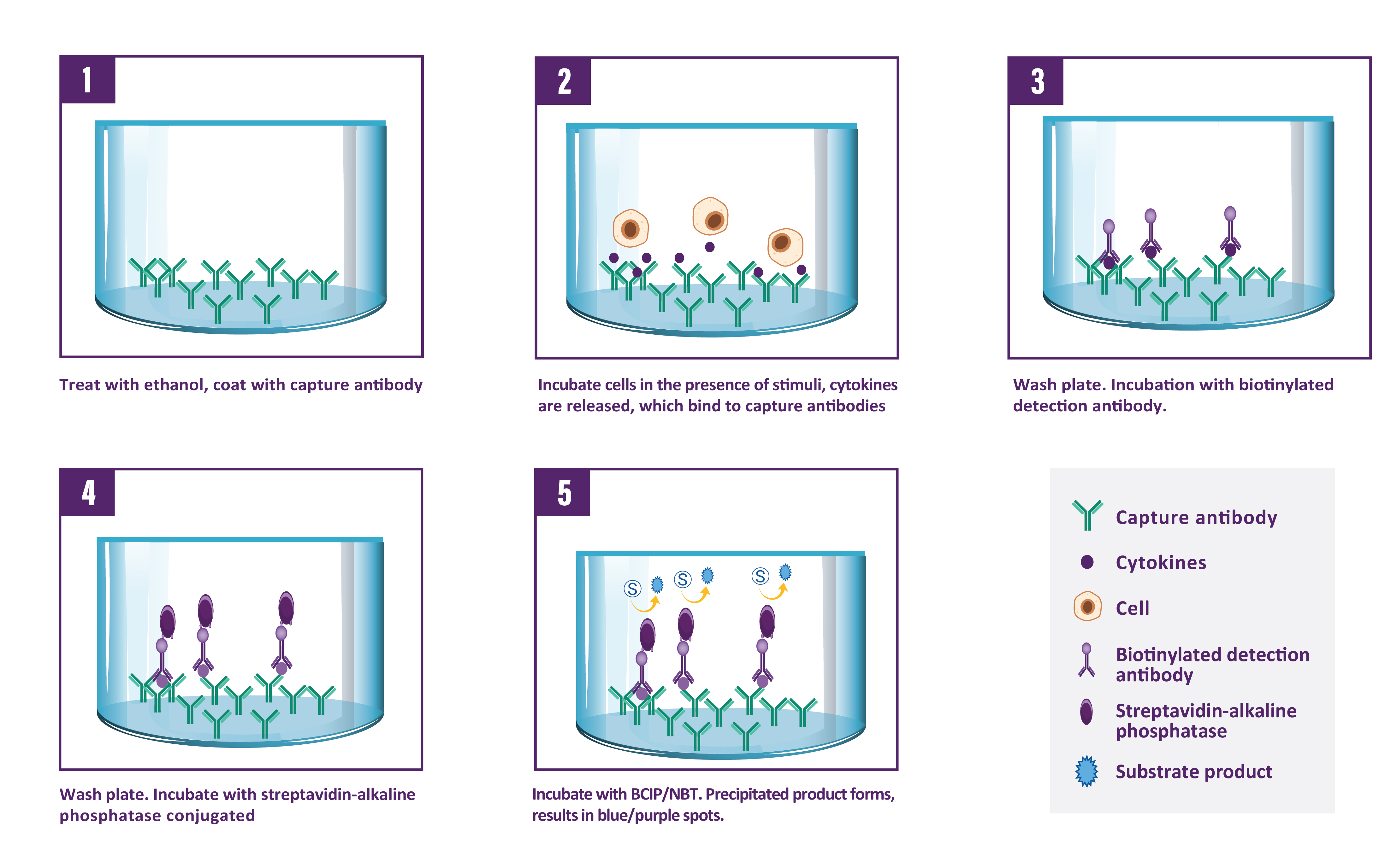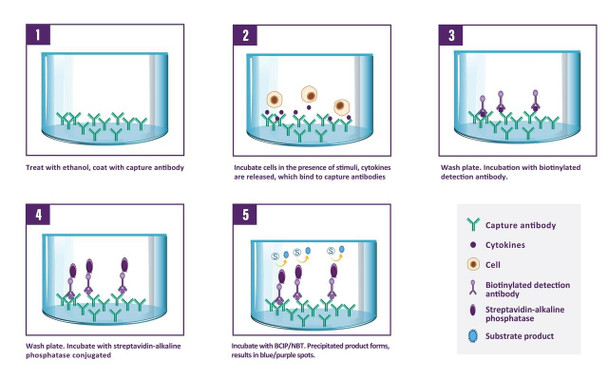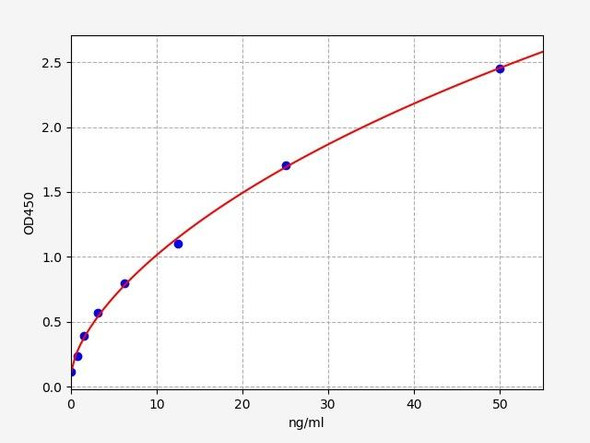Description
Human Perforin ELISpot Kit
Assay Genie ELISpot is a highly specific immunoassay for the analysis of Perforin production and secretion from T-cells at a single cell level in conditions closely comparable to the in-vivo environment with minimal cell manipulation. This technique is designed to determine the frequency of Perforin producing cells under a given stimulation and the comparison of such frequency against a specific treatment or pathological state. Utilising sandwich immuno-enzyme technology, Assay Genie ELISpot assays can detect both secreted Perforin (qualitative analysis) and single cells that produce Perforin (quantitative analysis). Cell secreted Perforin is captured by coated antibodies avoiding diffusion in supernatant, protease degradation or binding on soluble membrane receptors. After cell removal, the captured Perforin is revealed by tracer antibodies and appropriate conjugates.
Human Perforin ELISpot Kit
The Human Perforin ELISPOT Kit is a powerful tool for analyzing the levels of perforin in human immune responses. This kit is specially designed to provide accurate and sensitive detection of perforin in peripheral blood mononuclear cells (PBMCs) or isolated immune cells. With its high sensitivity and specificity, researchers can rely on this kit to deliver consistent and trustworthy results.Perforin is a key protein involved in the immune response, primarily known for its role in cytotoxic T cell and natural killer cell-mediated killing of infected or abnormal cells.
By measuring perforin levels, researchers can gain insights into immune function and monitor immune responses in various diseases, including cancer, viral infections, and autoimmune disorders.Overall, the Human Perforin ELISPOT Kit is an essential tool for studying immune responses and evaluating immune function in various research settings. Its precision and reliability make it an invaluable asset for researchers looking to advance our understanding of immune-mediated diseases and develop potential therapeutic interventions.
| Product type: | ELISpot Kit |
| Size: | 1 x 96 Assays |
| Target species: | Human |
| Specificity: | Recognizes natural human Perforin |
| Incubation: | 3h after cell stimulation |
| Kit content: | Assay Genie Pre-coated ELISpot kits include precoated PVDF plates, Detection antibody, Alkaline phosphatase conjugate, BSA, BCIP/NBT ready-to-use substrate buffer. |
| Synonyms: | N/A |
| Uniprot: | P14222 |
A capture antibody highly specific for Perforin is coated to the wells of a PVDF bottomed 96 well microtitre plate either during kit manufacture or in the laboratory. The plate is then blocked to minimise any non-antibody dependent unspecific binding and washed. Cell suspension and stimulant are added and the plate incubated allowing the specific antibodies to bind any Perforin produced. Cells are then removed by washing prior to the addition of Biotinylated detection antibodies which bind to the previously captured Perforin. Enzyme conjugated streptavidin is then added binding to the detection antibodies. Following incubation and washing, substrate is then applied to the wells resulting in coloured spots which can be quantified using appropriate analysis software or manually using a microscope.

| Step | Procedure |
| 1. | For PVDF membrane activation, add 25 µl of 35% ethanol to every well. |
| 2. | Incubate plate at room temperature (RT) for 30 seconds. |
| 3. | Empty the wells by flicking the plate over a sink & gently tapping on absorbent paper. Thoroughly wash the plate 3x with 100 µl of PBS 1X per well. |
| 4. | Add 100 µl of diluted capture antibody to every well. |
| 5. | Cover the plate and incubate at 4°C overnight. |
| 6. | Empty the wells as previous and wash the plate once with 100 µl of PBS 1X per well. |
| 7. | Add 100 µl of blocking buffer to every well. |
| 8. | Cover the plate and incubate at RT for 2 hours. |
| 9. | Empty the wells as previous and thoroughly wash once with 100 µl of PBS 1X per well. |
| 10. | Add 100 µl of sample, positive and negative controls cell suspension to appropriate wells providing the required concentration of cells and stimulant. |
| 11. | Cover the plate and incubate at 37°C in a CO2 incubator for an appropriate length of time (15-20 hours). Note: do not agitate or move the plate during this incubation. |
| 12. | Empty the wells and remove excess solution then add 100 µl of Wash Buffer to every well. |
| 13. | Incubate the plate at 4°C for 10 min. |
| 14. | Empty the wells as previous and wash the plate 3x with 100 µl of Wash Buffer. |
| 15. | Add 100 µl of diluted detection antibody to every well. |
| 16. | Cover the plate and incubate at RT for 1 hour 30 min. |
| 17. | Empty the wells as previous and wash the plate 3x with 100 µl of Wash Buffer. |
| 18. | Add 100 µl of diluted Streptavidin-conjugate to every well. |
| 19. | Cover the plate and incubate at RT following the supplier's instructions. |
| 20. | Empty the wells and wash the plate 3x with 100 µl of Wash Buffer. |
| 21. | Peel of the plate bottom and wash both sides of the membrane 3x under running distilled water, once washing complete remove any excess solution by repeated tapping on absorbent paper. |
| 22. | Add 100 µl of ready-to-use substrate buffer to every well. |
| 23. | Following the supplier's instructions, incubate the plate for 5-15 min monitoring spot formation visually throughout the incubation period to assess sufficient colour development. |
| 24. | Empty the wells and rinse both sides of the membrane 3x under running distilled water. Completely remove any excess solution by gentle repeated tapping on absorbent paper Read Spots: allow the wells to dry and then read results. The frequency of the resulting coloured spots. |
| UniProt Protein Function: | PRF1: Plays a key role in secretory granule-dependent cell death, and in defense against virus-infected or neoplastic cells. Plays an important role in killing other cells that are recognized as non-self by the immune system, e.g. in transplant rejection or some forms of autoimmune disease. Can insert into the membrane of target cells in its calcium-bound form, oligomerize and form large pores. Promotes cytolysis and apoptosis of target cells by facilitating the uptake of cytotoxic granzymes. Monomer, as sobluble protein. Homooligomer. Oligomerization is required for pore formation. Repressed by contact with target cells. Belongs to the complement C6/C7/C8/C9 family. |
| UniProt Protein Details: | Protein type:Membrane protein, multi-pass Chromosomal Location of Human Ortholog: 10q22 Cellular Component: membrane; cytoplasmic membrane-bound vesicle; integral to membrane; extracellular region; plasma membrane Molecular Function:protein binding; calcium ion binding; wide pore channel activity Biological Process: formation of immunological synapse; apoptosis; cytolysis; defense response to tumor cell; cellular defense response; immune response to tumor cell; defense response to virus; transmembrane transport; protein homooligomerization Disease: Lymphoma, Non-hodgkin, Familial; Aplastic Anemia; Hemophagocytic Lymphohistiocytosis, Familial, 2 |
| NCBI Summary: | The protein encoded by this gene has structural and functional similarities to complement component 9 (C9). Like C9, this protein creates transmembrane tubules and is capable of lysing non-specifically a variety of target cells. This protein is one of the main cytolytic proteins of cytolytic granules, and it is known to be a key effector molecule for T-cell- and natural killer-cell-mediated cytolysis. Defects in this gene cause familial hemophagocytic lymphohistiocytosis type 2 (HPLH2), a rare and lethal autosomal recessive disorder of early childhood. Alternative splicing results in multiple transcript variants encoding the same protein. [provided by RefSeq, Jul 2008] |
| UniProt Code: | P14222 |
| NCBI GenInfo Identifier: | 129819 |
| NCBI Gene ID: | 5551 |
| NCBI Accession: | P14222.1 |
| UniProt Secondary Accession: | P14222,Q59F57, Q86WX7, B2R6X4, |
| UniProt Related Accession: | P14222 |
| Molecular Weight: | 555 |
| NCBI Full Name: | Perforin-1 |
| NCBI Synonym Full Names: | perforin 1 (pore forming protein) |
| NCBI Official Symbol: | PRF1‚ ‚ |
| NCBI Official Synonym Symbols: | P1; PFP; FLH2; PFN1; HPLH2‚ ‚ |
| NCBI Protein Information: | perforin-1; cytolysin; lymphocyte pore forming protein; lymphocyte pore-forming protein |
| UniProt Protein Name: | Perforin-1 |
| UniProt Synonym Protein Names: | Cytolysin; Lymphocyte pore-forming protein; PFP |
| Protein Family: | Perforin |
| UniProt Gene Name: | PRF1‚ ‚ |
| UniProt Entry Name: | PERF_HUMAN |






